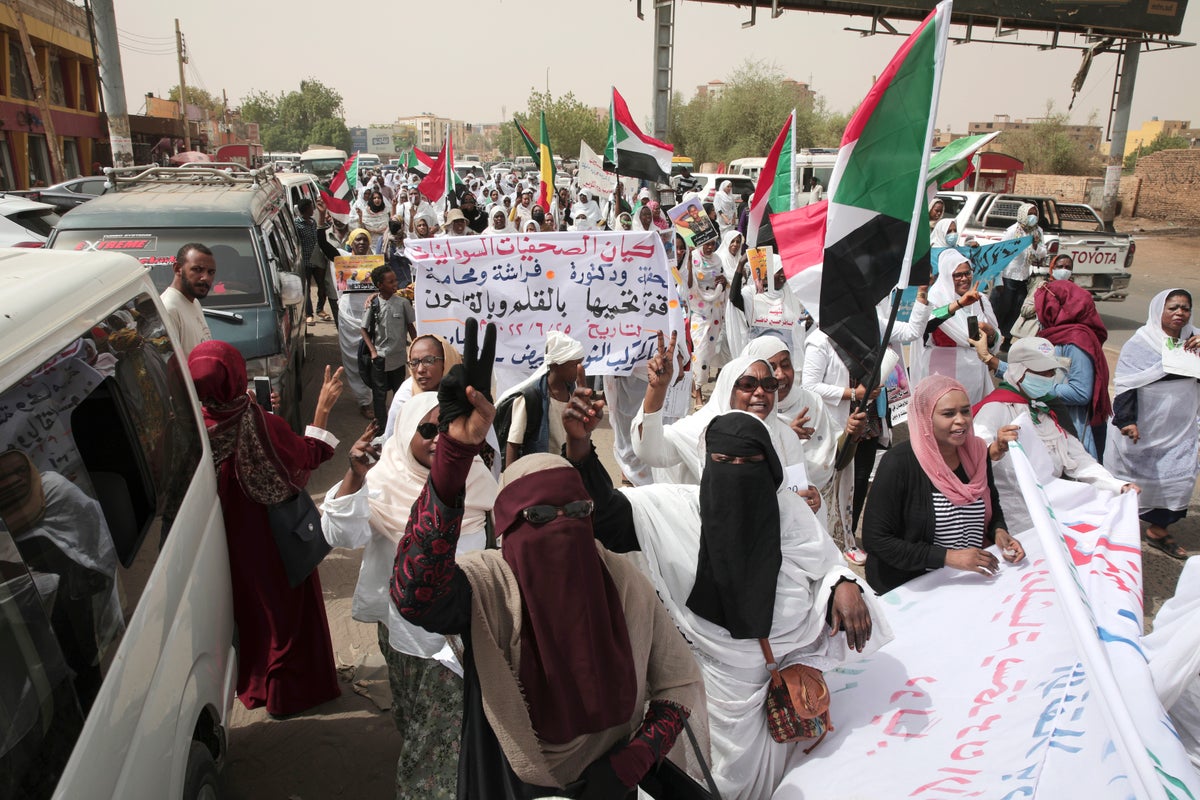
Sudanese security forces shot and killed four people during anti-coup protests Thursday, a medical group said as thousands marched to denounce the country’s military rulers and demand an immediate transfer of power to civilians.
The Sudan’s Doctors Committee said in a tweet that the four were fatally shot when police fired live ammunition at protesters in Omdurman, the twin city of Khartoum, the Sudanese capital. The committee, which tracks casualties during protests, said the identity of those killed was not immediately known.
Across the Nile River in Khartoum, police fired tear gas at thousands of demonstrators trying to reach the Republican Palace, the military's seat of power in the heart of the city. Videos showing thousands waving Sudanese flags and running under clouds of tear gas were posted on social media.
Other videos show demonstrators raising banners reading “No Negotiations! No Partnership” — reiterating their opposition to any power-sharing deal with the military rulers.
Sudan’s leading pro-democracy groups — Forces for the Declaration of Freedom and Change and the Resistance Committees — had called for nationwide protest on Thursday to reiterate their demands for a reversal of the Oct. 25 military coup. The takeover upended the East African country’s short-lived transition to democracy following the 2019 ouster of longtime autocratic ruler Omar al-Bashir.
Thursday's protests also fell on the third anniversary of a 2019 mass rally that forced the generals to sit down at the negotiating table with pro-democracy groups and eventually sign a power-sharing agreement that was expected to govern Sudan during a transitional period, until general elections were to be held. However, the coup last October scuttled this arrangement.
Meanwhile, the London-based internet advocacy group, NetBlocks, said internet access was disrupted across many mobile and fixed-line internet providers in Sudan on Thursday, including state operator Sudantel, leaving national connectivity at only 17% of its ordinary level.
“The restrictions impact many internet users in Sudan and are likely to significantly limit coverage of events on the ground,” the statement said.
The October coup has triggered near-daily street protests, which authorities have met with a deadly crackdown that has so far killed 107 people, including Thursday's casualties. Among those killed were 17 children, according to the Doctors Committee.
Hundreds of people, including prominent politicians and activists, have been detained, although many have been released recently as part of trust-building measures. Internet shutdowns and blockings have been routinely recorded ahead of most anti-coup protests.
“NetBlocks recommends against the use of network disruptions and social media restrictions to counter protests, given their disproportionate impact to fundamental rights including freedom of expression and freedom of assembly,” said the London-based group.
Since the coup, the U.N. political mission in Sudan, the African Union, and the eight-nation east African regional Intergovernmental Authority in Development group have been trying to broker a way out of the current political impasse. Earlier this month, the leading pro-democracy group finally agreed to sit with the generals in a meeting that was brokered by the United States and Saudi Arabia.
However, no breakthrough has materialized from these talks.







